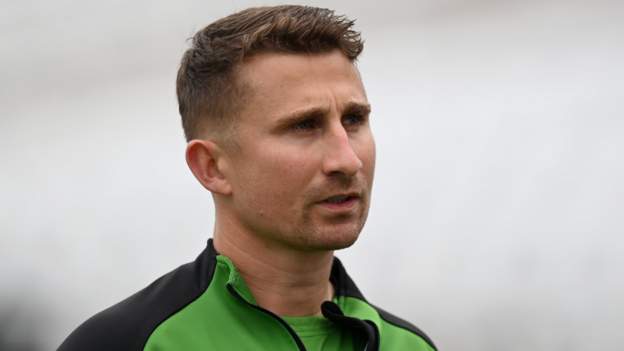In the aftermath of Luton captain Tom Lockyer’s harrowing on-pitch cardiac arrest during a Premier League match against Bournemouth, former cricketer James Taylor, who himself had to cut short his cricket career due to a heart condition, emphasizes the crucial need for continued enhancement of heart screenings in sports. Taylor’s perspective sheds light on the importance of proactive measures to safeguard athletes’ well-being.
Tom Lockyer, the stalwart captain of Luton, finds himself in a hospital bed, his collapse during the Saturday game casting a stark reminder of the unpredictable nature of heart-related incidents in sports. James Taylor, a former England batter whose promising cricket journey was abruptly halted at the age of 26 due to a heart ailment, shares his insights on the matter.
While acknowledging the commendable job done by current screening processes, Taylor underscores the perpetual quest for improvement. “Screening processes do a fantastic job but we can always be better,” he asserts. His words resonate as a call to action for the sporting world, where the well-being of athletes should be paramount.
Taylor, speaking on 5 Live Breakfast, adds, “It is a really sad case, and thankfully Tom has got great care where he is now.” His empathy for Lockyer’s situation is palpable, highlighting the solidarity among athletes when faced with such health crises.
The incident at the Vitality Stadium, where Lockyer collapsed during the second half, led to the suspension of the game and brought into focus the fragility of human life in the midst of athletic competition. It serves as a stark reminder that no one is immune to such medical emergencies, regardless of their fitness level or prior medical history.
James Taylor’s call for the continuous improvement of screening protocols in sports is not without merit. In a statement, Luton Town announced that Lockyer is currently undergoing “tests and scans” in the hospital, and the results will determine the next steps in his recovery. This incident follows a previous episode in which Lockyer collapsed during Luton’s play-off final win against Coventry in May, which led to heart surgery and subsequent clearance to return to play in June.
Professor Aneil Malhotra, a cardiologist working with Premier League teams, offers valuable insights into the stringent testing and assessment that athletes like Lockyer undergo before being allowed to resume play. “Our understanding of conditions affecting the heart has evolved,” he explains, “and an athlete-centred approach has been adopted, where one can reduce potential harm while supporting the player to follow their aspirations.” This holistic approach to athlete health is a testament to the dedication of medical professionals in ensuring the well-being of those in the sporting world.
As we reflect on Tom Lockyer’s situation, James Taylor’s words echo in our minds, serving as a poignant reminder that while we have made strides in safeguarding athletes’ health, there is always room for improvement. In the realm of sports, where competition and camaraderie often take center stage, the well-being of athletes should remain a top priority, and the pursuit of better screening protocols should be an ongoing mission.
In this age of athletic excellence, we must not forget that the heart, the most vital muscle in an athlete’s body, deserves the utmost care and attention. Tom Lockyer’s ordeal should serve as a catalyst for positive change, a reminder that in sports, as in life, the heart’s health is paramount.
Frequently Asked Questions (FAQs) about Cardiac Health in Sports
Q: Who is Tom Lockyer, and what happened during the Premier League game against Bournemouth?
A: Tom Lockyer is the captain of Luton Town, and during a Premier League game against Bournemouth, he experienced a cardiac arrest on the pitch, leading to the suspension of the match and immediate medical attention.
Q: How does James Taylor, the former cricketer, relate to this incident?
A: James Taylor, a former England batter, shares a similar experience of having to end his cricket career due to a heart condition. He emphasizes the need for improved heart screenings in sports, given his personal ordeal and empathy for Tom Lockyer’s situation.
Q: Why does James Taylor believe that heart screenings in sports need improvement?
A: While acknowledging the effectiveness of current screening processes, James Taylor believes that there is always room for improvement in ensuring athletes’ cardiac health. He emphasizes the importance of continuous enhancement to safeguard athletes’ well-being.
Q: What is the current status of Tom Lockyer’s health after the cardiac arrest incident?
A: Tom Lockyer is in the hospital, undergoing “tests and scans” to determine the next steps in his recovery. This incident followed a previous collapse in May, leading to heart surgery and subsequent clearance to return to play in June.
Q: What insights does Professor Aneil Malhotra, the cardiologist, provide regarding athlete health?
A: Professor Aneil Malhotra, who works with Premier League teams, explains that an athlete-centered approach has been adopted, focusing on reducing potential harm while supporting players to pursue their aspirations. He highlights the stringent testing and assessment that athletes like Tom Lockyer undergo before resuming play.
More about Cardiac Health in Sports
- Tom Lockyer: Luton captain in hospital after cardiac arrest
- James Taylor: Former cricketer forced to retire due to heart condition
- Cardiac Health in Athletes: The Need for Screening
- Importance of Athlete-Centered Heart Screening
- Luton Town statement on Tom Lockyer’s health
- Understanding Cardiac Health in Athletes: A Cardiologist’s Perspective

1 comment
Better heart screening in sports = smart move. athletes’ health first!